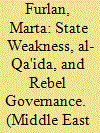| Srl | Item |
| 1 |
ID:
186014


|
|
|
|
|
| Summary/Abstract |
Existing literature argues that the militants and suicide bombers of the Islamic Resistance Movement (Hamas) and Palestinian Islamic Jihad (PIJ) come from relatively advantaged socioeconomic and educational backgrounds compared to the average Palestinian in the Occupied Palestinian Territories. Analyzing 2,448 martyr biographies from Hamas's military wing and PIJ from 1992 to 2012, I argue that these militants reflect Palestinian labor divisions and educational enrollment rates. There is thus little to suggest that Palestinian Islamist militants are recruited from any particular socioeconomic stratum within the wider population. I demonstrate that, instead, kinship and geographic clusters are more significant variables.
|
|
|
|
|
|
|
|
|
|
|
|
|
|
|
|
| 2 |
ID:
186012


|
|
|
|
|
| Summary/Abstract |
How have perceptions of Yemen's 1962 revolution changed since the modern state's founding and how has the government attempted to control historical memory? A comparison of al-Thawra, the Yemeni republic's first modern newspaper, and a 40th anniversary conference in 2002 reveals how Yemen failed to reconcile the bloody legacy of its revolution. This failure allowed tensions — between tribes and the government and between regional factions — to undermine the revolutionary legacy, leading to President 'Ali 'Abdullah Salih's resignation in 2012 and the civil war in the ensuing years.
|
|
|
|
|
|
|
|
|
|
|
|
|
|
|
|
| 3 |
ID:
186011


|
|
|
|
|
| Summary/Abstract |
As the Arab Spring arrived in Yemen, al-Qa'ida joined the insurgency, conquered territories, and governed them. Eleven years later, I aim to assess whether the conditions that led to the group's emergence as both insurgent and governor have changed. I argue that, while al-Qa'ida is weaker, Yemen remains deeply vulnerable with a government in exile, an ongoing civil war, and armed groups in control of extensive territory. In this context, a resurgence of al-Qa'ida cannot be excluded.
|
|
|
|
|
|
|
|
|
|
|
|
|
|
|
|
| 4 |
ID:
186013


|
|
|
|
|
| Summary/Abstract |
North Africa is often perceived to be vulnerable to threats from returning jihadist fighters coming home from campaigns in Syria and Iraq, especially in the aftermath of the Islamic State organization's 2019 collapse. This article, however, argues that the danger posed to the Maghrib by foreign fighter returnees is less acute than predicted. The reasons for this diminished threat include the civil war in Libya, disaffection due to intra-jihadist infighting, and North African states' programs offering rehabilitative pathways to former radicals in exchange for cooperation.
|
|
|
|
|
|
|
|
|
|
|
|
|
|
|
|
| 5 |
ID:
186015


|
|
|
|
|
| Summary/Abstract |
This article draws upon a collection of hundreds of photos and videos of protests from Syria between 2012 and 2016 to explain the temporal and spatial variation in women's protest participation during the conflict. Where armed groups with conservative gender ideologies had the capacity to be involved in local politics, they were able to limit women's access to public spaces, including political protests. This article also responds to existing explanations for the absence of women from protests that focus on violence and social norms.
|
|
|
|
|
|
|
|
|
|
|
|
|
|
|
|